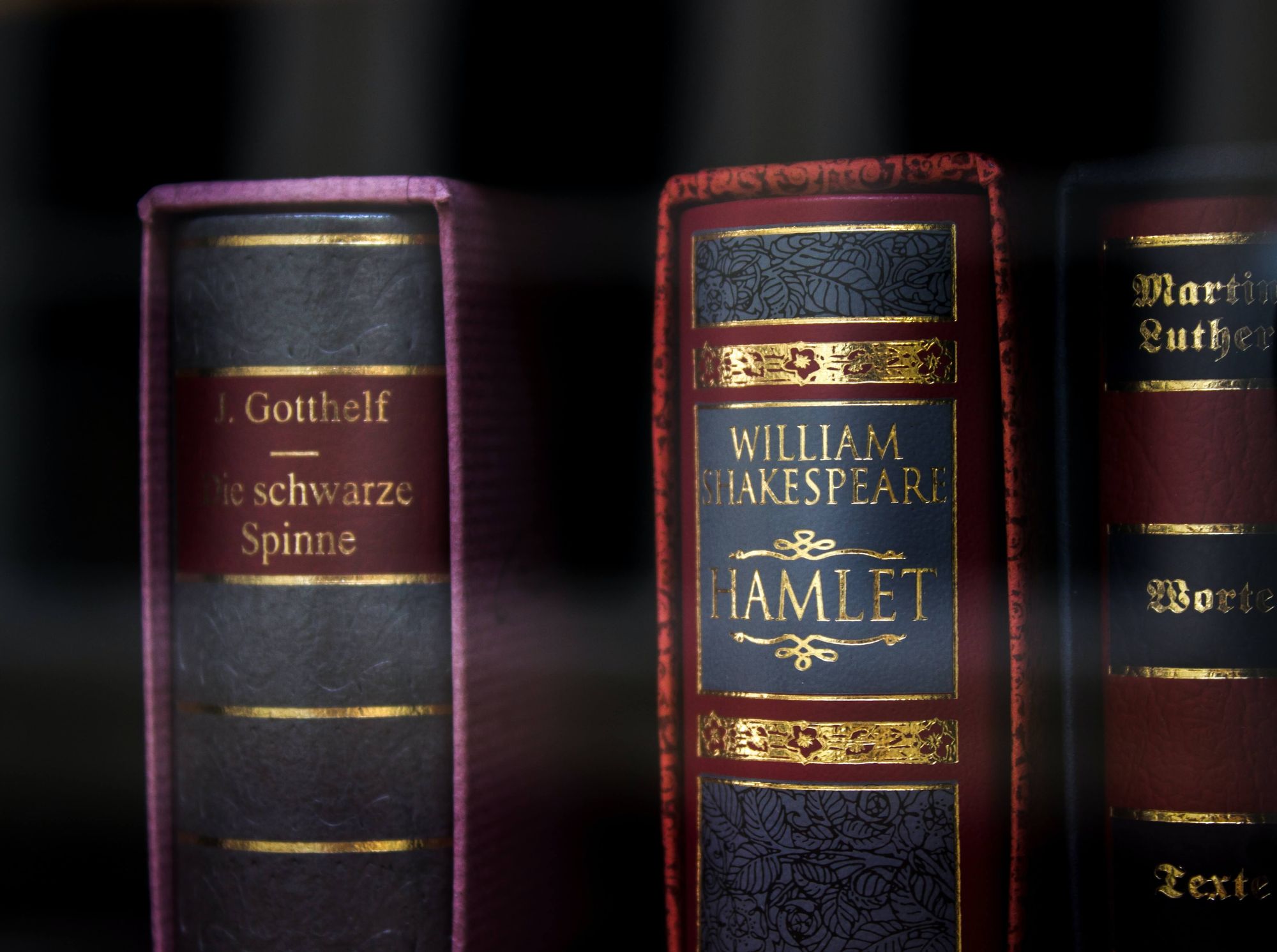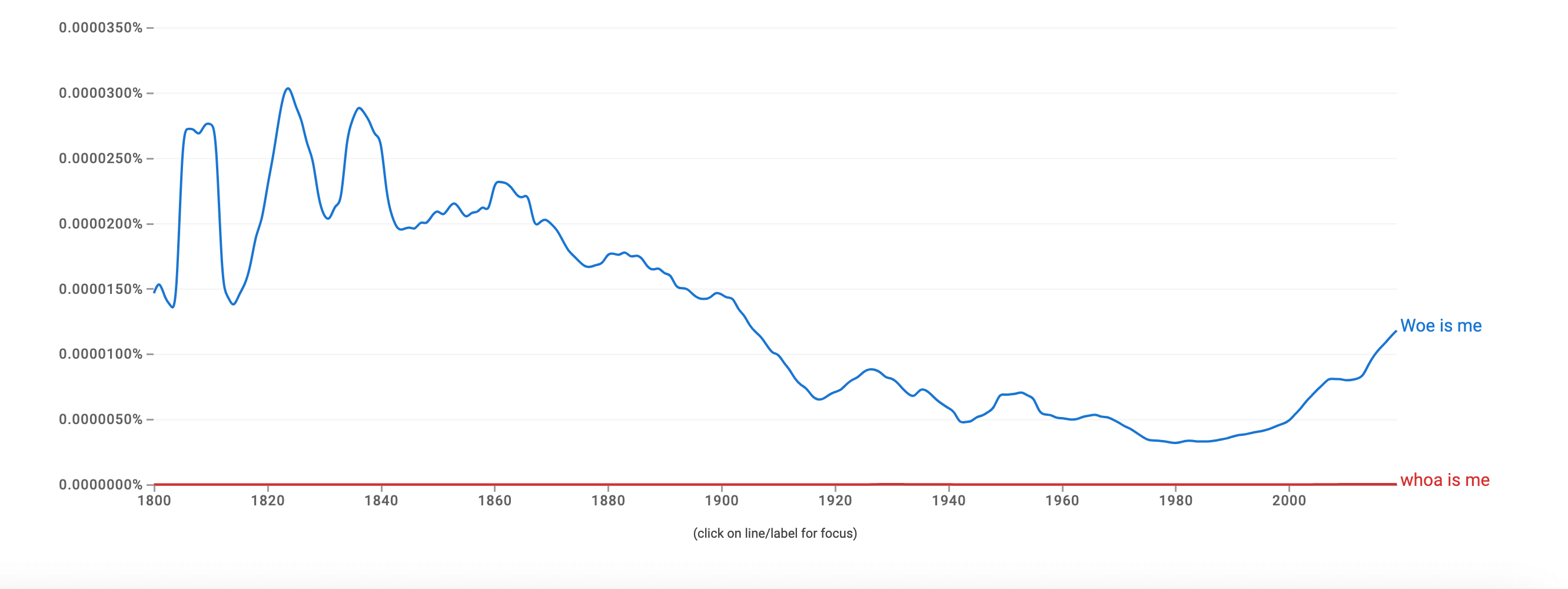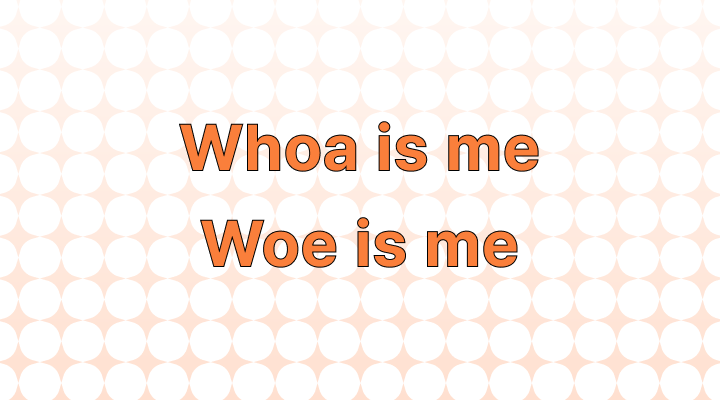- "Whoa is me" is an incorrect version of "Woe is Me."
- The phrase "Woe is me" finds its roots in ancient English literature and has been used for centuries to express a deep sense of sorrow or misfortune. It's a concise and powerful way to communicate a personal or collective sense of anguish.
Ah, "Woe is me." Those three little words, laden with self-pity and dramatic resignation, have echoed through history, painting us a picture of misery in a single breath. But where does this phrase come from? And why do we still use it, even in jest, after all these years?

Examining the graph below, we can see that "woe is me" has been used more than the other phrase "whoa is me." "Woe is me" was used most during the 1800s, and dropped in use in the 1900s. It is experiencing an increase in popularity in the 2000s.

Why is "woe is me" confused with "whoa is me?"
There are a few reasons why "woe is me" and "whoa is me" get confused:
1. Sound-Alike Words: Both phrases share the same stress pattern and similar pronunciations for the first two syllables. "Woe" and "whoa" can easily sound similar, especially in casual speech.
2. Spelling Ambiguity: Although written differently, "woe" and "whoa" have a few common letters ("wo" or "oa"). This visual similarity can create confusion, especially for people who are unfamiliar with the phrase "woe is me."
3. Lack of Context: Often, these phrases are used in informal contexts where pronunciation might be less precise, further blurring the lines between them. Without clear context, it can be difficult to discern the intended meaning.
4. Misinterpretation of "Woah": While "whoa" generally expresses surprise or admiration, it can also be used sarcastically or ironically. When used ironically, it might sound similar to the lamenting tone of "woe is me," leading to misinterpretation.
Origins of "woe is me"
From Ancient Greeks to Twitter Tears
Our journey begins in ancient Greece, where the phrase "moi moira" or "woe is me" graced the tragedies of playwrights like Aeschylus and Sophocles. Used by heroes mourning defeat and loss, it established itself as a potent tool for conveying profound sorrow. Fast forward a few millennia, and we find "Woe is me" gracing the pages of Shakespeare, the mouths of Dickens characters, and even the diary entries of our own grandmother.
Shakespearean Influence
The phrase gained prominence during the Elizabethan era, thanks in part to the works of William Shakespeare. Characters in Shakespearean plays often uttered variations of "Woe is me" to convey their suffering or despair. The Bard's influence solidified the phrase as a timeless expression of sorrow.
Taking apart "woe is me"
Subject-Verb Agreement:
- Subject: "Me"
- Verb: "is"In traditional grammar terms, "me" is the subject of the sentence, and "is" is the linking verb. The structure adheres to the subject-verb agreement.
Pronoun Usage:
- "Me" is a pronoun, specifically an objective pronoun, which is used as the subject complement after the linking verb "is." The phrase uses "me" to express the person experiencing woe or sorrow.
Inversion:
- The structure of "Woe is me" features an inversion of the typical word order found in declarative sentences. In a standard English sentence, the subject usually precedes the verb. However, in this poetic or archaic expression, the order is reversed for emphasis or stylistic reasons.
Expression of Woe:
- The word "woe" is a noun that refers to deep sorrow or distress. In this phrase, "Woe is me," the noun "woe" serves as the subject complement, indicating the emotional state of the speaker.
How to pronounce "woe is me"
Pronouncing "woe is me" correctly adds a touch of dramatic flair to your lament! Here's how to nail it:
Woe:
- Pronounced like "woh," rhyming with "go" or "so."
- Imagine a long, drawn-out sigh escaping your lips.
- Avoid emphasizing the "w" like in "wow."
Is:
- Short and sweet, like the "i" in "bit."
- Don't stretch it out or emphasize it.
Me:
- Another short and soft "i" sound, similar to "is."
- Maintain a consistent tone with the previous syllables.
Putting it all together:
- The overall stress of the phrase should be on the first syllable, "WOH-is-me."
- Speak with a slightly mournful yet theatrical tone, drawing out the vowels slightly for emphasis.
- Imagine you're delivering a line from a Shakespearean tragedy, but with a playful wink.
Bonus tips:
- Tilt your head down slightly and add a subtle frown for the full dramatic effect.
- If you're really going for it, a sigh at the end can punctuate the woe perfectly.
Synonyms for woe is me
The phrase "Woe is me" expresses a sense of lamentation or sorrow. Here are some synonyms and alternative expressions that convey a similar sentiment:
Alas for me:
- This phrase is a more formal and traditional way of expressing sorrow or regret.
Oh, the misery:
- This variation emphasizes a feeling of misery or distress.
Pity me:
- This expression implies a desire for sympathy or understanding in the face of difficulties.
Oh, wretched me:
- The use of "wretched" intensifies the sense of misery or unhappiness.
Lamentably, I:
- A more formal and structured way of expressing personal lamentation.
Ah, the pain of it:
- This conveys a sense of emotional pain or distress.
Cry for me:
- This phrase suggests a call for empathy or support in times of trouble.
Dear me:
- While less intense, this expression can still convey a sense of concern or distress.
Want to sound like a native speaker?
Engram’s AI-powered grammar checker makes your English sound like a native speaker’s, suggesting natural English expressions on top of fixing grammar, spelling, punctuation, word order, and vocabulary.

References:














